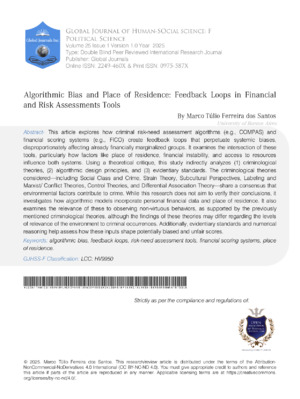Algorithmic Bias and Place of Residence: Feedback Loops in Financial and Risk Assessment Tools
Keywords:
algorithmic bias, feedback loops, risk-need assessment tools, financial scoring systems, place of residence
Abstract
This article explores how criminal risk-need assessment algorithms e g COMPAS and financial scoring systems e g FICO create feedback loops that perpetuate systemic biases disproportionately affecting already financially marginalized groups It examines the intersection of these tools particularly how factors like place of residence financial instability and access to resources influence both systems Using a theoretical critique this study indirectly analyzes 1 criminological theories 2 algorithmic design principles and 3 evidentiary standards The criminological theories considered including Social Class and Crime Strain Theory Subcultural Perspectives Labeling and Marxist Conflict Theories Control Theories and Differential Association Theory share a consensus that environmental factors contribute to crime While this research does not aim to verify their conclusions it investigates how algorithmic models incorporate personal financial data and place of residence It also examines the relevance of these to observing nonvirtuous behaviors as supported by the previously mentioned criminological theories although the findings of these theories may differ regarding the levels of relevance of the environment to criminal occurrences Additionally evidentiary standards and numerical reasoning help assess how these inputs shape potentially biased and unfair scores Findings suggest that low scores in one system exacerbate low scores in the other creating a cyclical disadvantage This reinforces economic and social inequities calling for greater scrutiny transparency and fairness in algorithmic design and application Ignoring these issues risks deepening poverty restricting credit access and increasing incarceration rates among financially marginalized communities By highlighting these feedback loops this study aims to inform academic research and policy reforms to miti
Downloads
How to Cite
References

Published
2025-02-19
Issue
Section
License
Copyright (c) 2025 Authors and Global Journals Private Limited

This work is licensed under a Creative Commons Attribution 4.0 International License.